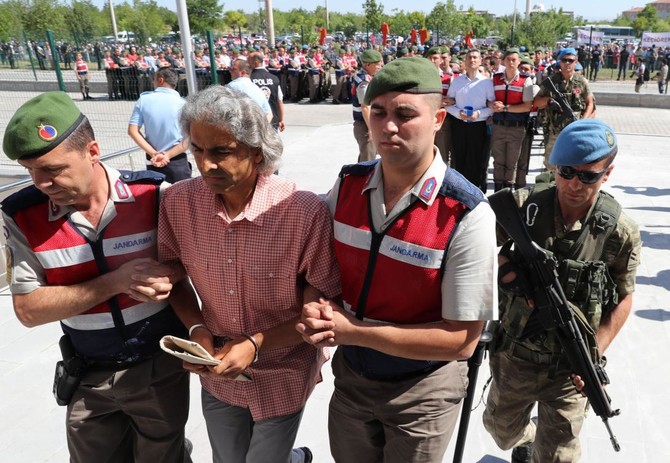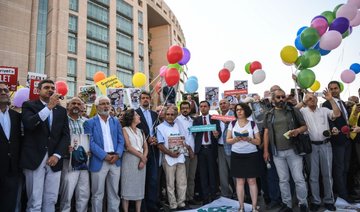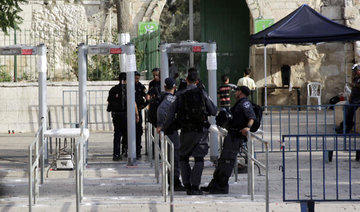TURKEY: Nearly 500 people appeared in court Tuesday in the biggest trial yet of suspects from Turkey’s failed coup, facing charges of conspiring to oust the government from an air base seen as the plotters’ hub.
Forty-one of those held were marched into the court outside Ankara one-by-one in a long line in front of television cameras and the public, with each suspect held by two members of the Turkish gendarmerie and flanked by an armed soldier.
People chanted “we want the death penalty!” and some threw nooses toward the suspects. The death penalty has been abolished in Turkey since 2004.
There were also chants of “martyrs don’t die, the nation won’t be divided.” Some people threw water bottles, an AFP reporter said.
Nazan Aytop, who came to court to make sure the blood of the 249 victims of the coup “was not given in vain” said she hoped the “accused will be given the sentence they deserve.”
A total of 486 suspects have been indicted in the case and almost all — a total of 461 — are held in custody while seven are still on the run and the remainder charged but not in jail.
During the tense opening hearing, veterans and relatives of those killed on the night of the coup bid booed the suspects’ lawyers, Dogan news agency reported.
Some lawyers hit tables to protest the “physical intervention” by some of the victims’ families as they walked past them, the agency said.
The suspects are accused of running the coup bid from the Akinci air base northwest of the capital, which the authorities regard as the headquarters of the plotters where orders were sent out for fighter jets to bomb parliament.
They are charged with crimes ranging from murder, violating the constitution and attempting to kill President Recep Tayyip Erdogan.
If convicted, they face life imprisonment.
Among the main suspects named in the indictment but still on the run is US-based Muslim cleric Fethullah Gulen, who is accused of ordering the attempted July 15, 2016 putsch.
Gulen, who is based in a secluded compound in the US state of Pennsylvania, strongly denies the charges.
Those held in custody include former air force chief Akin Ozturk who, like several suspects, is also on trial in another case related to the coup bid.
Another chief suspect is theology lecturer Adil Oksuz, whom Turkish officials accuse of being the so-called “imam” of the plot by coordinating the action on the ground in Turkey with Gulen.
Businessman Kemal Batmaz is meanwhile accused of assisting Oksuz.
Oksuz was detained following the coup’s defeat, but was subsequently released and is now on the run. Batmaz is in custody in Sincan prison outside Ankara.
Batmaz led the line of suspects into court wearing a cream shirt with black trousers followed by Ozturk wearing a grey shirt and black trousers.
Chief of Staff General Hulusi Akar and other senior commanders were held hostage at the base during the coup attempt before they were freed on the morning on July 16.
The base was seen as the coup bid headquarters where commands were given for the F-16 fighter jets to attack and fly them above the capital.
The Turkish parliament was bombed three times by F-16s.
The trial is taking place in Turkey’s largest courtroom established inside a prison complex in Sincan to hear coup-related trials and has space for 1,558 people.
The courtroom has previously hosted mass trials related to the coup bid including one which opened in February of 330 suspects accused of murder or attempted murder.
And in May, 221 suspects were put on trial accused of being the ringleaders of the failed coup.
The attempted coup left 249 people dead, the Turkish presidency says, not including 24 coup-plotters killed on the night.
There was heavy security including 1,130 security personnel inside and outside the courtroom, according to state-run news agency Anadolu, as well as snipers, armored security vehicles and a drone.
The trial is one of several held across Turkey judging coup suspects, in the largest legal process in the country’s modern history.
Over 50,000 people have been arrested over alleged links to Gulen in a wide-scale crackdown under the state of emergency imposed following the coup.
Almost 500 suspects on trial in Turkey’s biggest coup case
Almost 500 suspects on trial in Turkey’s biggest coup case

UN chief condemns ‘escalation’ between Yemen’s Houthis and Israel

- UN Secretary-General Antonio Guterres calls Israeli strikes on Sanaa airport ‘especially alarming’
NEW YORK: The UN chief on Thursday denounced the “escalation” in hostilities between Yemen’s Houthi militias and Israel, terming strikes on the Sanaa airport “especially alarming.”
“The Secretary-General condemns the escalation between Yemen and Israel. Israeli airstrikes today on Sana’a International Airport, the Red Sea ports and power stations in Yemen are especially alarming,” said a spokesperson for UN Secretary-General Antonio Guterres in a statement.
Israeli air strikes pummeled Sanaa’s international airport and other targets in Yemen on Thursday, with Houthi militia media reporting six deaths.
The attack came a day after the Houthis fired a missile and two drones at Israel.
World Health Organization chief Tedros Adhanom Ghebreyesus said on social media he was at the airport during the strike, with the UN saying that a member of its air crew was injured.
The United Nations put the death toll from the airport strikes at three, with “dozens more injured.”
UN chief Guterres expressed particular alarm at the threat that bombing transportation infrastructure posed to humanitarian aid operations in Yemen, where 80 percent of the population is dependent on aid.
“The Secretary-General remains deeply concerned about the risk of further escalation in the region and reiterates his call for all parties concerned to cease all military actions and exercise utmost restraint,” he said.
“He also warns that airstrikes on Red Sea ports and Sana’a airport pose grave risks to humanitarian operations at a time when millions of people are in need of life-saving assistance.”
The UN chief condemned the Houthi militias for “a year of escalatory actions... in the Red Sea and the region that threaten civilians, regional stability and freedom of maritime navigation.”
The Houthis are part of Iran’s “axis of resistance” alliance against Israel.
Bodies of about 100 Kurdish women, children found in Iraq mass grave

TAL AL-SHAIKHIA, Iraq: Iraqi authorities are working to exhume the remains of around 100 Kurdish women and children thought to have been killed in the 1980s under former Iraqi ruler Saddam Hussein, three officials said.
The grave was discovered in Tal Al-Shaikhia in the Muthanna province in southern Iraq, about 15-20 kilometers (10-12 miles) from the main road there, an AFP journalist said.
Specialized teams began exhuming the grave earlier this month after it was initially discovered in 2019, said Diaa Karim, the head of the Iraqi authority for mass graves, adding that it is the second such grave to be uncovered at the site.
“After removing the first layer of soil and the remains appearing clearly, it was discovered that they all belonged to women and children dressed in Kurdish springtime clothes,” Karim told AFP on Wednesday.
He added that they likely came from Kalar in the northern Sulaimaniyah province, part of what is now Iraq’s autonomous Kurdistan region, estimating that there were “no less than 100” people buried in the grave.
Efforts to exhume all the bodies are ongoing, he said, adding that the numbers could change.
Following Iraq’s deadly war with Iran in the 1980s, Saddam’s government carried out the ruthless “Anfal Operation” between 1987 and 1988 in which it is thought to have killed around 180,000 Kurds.
Saddam was toppled in 2003 following a US-led invasion of Iraq and was hanged three years later, putting an end to Iraqi proceedings against him on charges of genocide over the Anfal campaign.
Karim said a large number of the victims found in the grave “were executed here with live shots to the head fired at short range.”
He suggested some of them may have been “buried alive” as there was no evidence of bullets in their remains.
Ahmed Qusai, the head of the excavation team for mass graves in Iraq, meanwhile pointed to “difficulties we are facing at this grave because the remains have become entangled as some of the mothers were holding their infants” when they were killed.
Durgham Kamel, part of the authority for exhuming mass graves, said another mass grave was found at the same time that they began exhuming the one at Tal Al-Shaikhia.
He said the burial site was located near the notorious Nugrat Al-Salman prison where Saddam’s authorities held dissidents.
The Iraqi government estimates that about 1.3 million people disappeared between 1980 and 1990 as a result of atrocities and other rights violations committed under Saddam.
Brother of suspected ‘terrorist’ stabs Tunisia National Guard officer

TUNIS: The brother of a suspected “terrorist” on Thursday stabbed a Tunisian National Guard officer in the eastern Monastir governorate, a judicial source told AFP.
Earlier in the day, a National Guard unit attempted to arrest the suspect — accused by authorities of being a member of a “terrorist group” — at his home, said the source, speaking on condition of anonymity.
During the arrest operation, his brother attacked the officer, the source added.
The source said the officer was hospitalized following the stabbing in his abdomen and was recovering after undergoing surgery.
An investigation was opened by the judicial division combatting terrorism, the source added.
Neither of the brothers, both of whom were taken into police custody, have been named, and the Tunisian interior ministry did not respond to AFP’s request for comment.
Tunisia saw a surge in jihadist groups after the 2011 revolution that overthrew the dictatorship of Zine El Abidine Ben Ali.
Attacks claimed by jihadists in recent years have killed dozens of soldiers and police officers, as well as some civilians and foreign tourists.
Jihadist attacks in Sousse and the capital Tunis in 2015 killed dozens of tourists and police, but authorities say they have since made significant progress against extremism.
Palestinian hospital director says Israeli strike kills 5 staff in Gaza

- WHO has described conditions at Kamal Adwan hospital as “appalling” and said it was operating at a “minimum” level
GAZA STRIP: Five staff at one of northern Gaza’s last functioning hospitals were killed by an Israeli strike on Thursday, the facility’s director said, more than two months into an Israeli operation in the area.
Hossam Abu Safiya, head of the Kamal Adwan hospital in Beit Lahia, said “an Israeli strike resulted in five martyrs among the hospital staff.” The Israeli military did not immediately respond to a request for comment.
Israel has been pressing a major offensive in northern Gaza since October 6, saying it aims to prevent Hamas militants from regrouping.
At the other end of the Palestinian territory, the chief paediatric doctor at the Nasser Hospital in Khan Yunis said three babies had died from a “severe temperature drop” this week as winter cold sets in.
Doctor Ahmed Al-Farra said the most recent case was a three-week-old girl who was “brought to the emergency room with a severe temperature drop, which led to her death.”
A three-day-old baby and another “less than a month old” died on Tuesday, he said.
Meanwhile, in central Gaza, a Palestinian TV channel affiliated with a militant group said five of its journalists were killed on Thursday in an Israeli strike on their vehicle in Gaza, with Israel’s military saying it had targeted a “terrorist cell.”
Witnesses said a missile struck the van while it was parked outside Al-Awda Hospital in Nuseirat.
The three-week-old girl, Sila Al-Faseeh, was living in a tent in Al-Mawasi, an area designated a humanitarian safe zone by the Israeli military that is home to huge numbers of displaced Palestinians.
“The tents do not protect from the cold, and it gets very cold at night, with no way to keep warm,” said Farra.
He said many mothers were suffering from malnutrition which affected the quality of their breast milk and compounded the risks to newborns.
Sila’s father Mahmoud Al-Faseeh said it was “extremely cold, and the tent is not suitable for living. The children are always sick.”
The United Nations and other organizations have repeatedly decried the worsening humanitarian conditions in Gaza, particularly in the north, since Israel began its latest military offensive in early October.
The World Health Organization has described conditions at Kamal Adwan hospital as “appalling” and said it was operating at a “minimum” level.
Earlier on Thursday, Gaza’s civil defense agency said that five other people had been killed by Israeli strikes during the day in the north of Gaza.
Meanwhile, the Israeli military said a 35-year-old soldier was killed in the central Gaza Strip. It brings to 390 the number of Israeli soldiers killed since the start of ground operations in the Palestinian territory.
The journalists’ employer Al-Quds Today said in a statement that a missile hit their broadcast van while it was parked in the Nuseirat refugee camp in central Gaza.
The channel is affiliated with Islamic Jihad, whose militants have fought alongside Hamas in the Gaza Strip and took part in the October 7, 2023 attack on Israel that sparked the war.
The station identified the five staffers as Faisal Abu Al-Qumsan, Ayman Al-Jadi, Ibrahim Al-Sheikh Khalil, Fadi Hassouna and Mohammed Al-Ladaa.
They were killed “while performing their journalistic and humanitarian duty,” the statement said.
The Israeli military said it had conducted a “precise strike” and that those killed “were Islamic Jihad operatives posing as journalists.”
The Committee to Protect Journalists’ Middle East arm said in a statement it was “devastated by the reports.”
“Journalists are civilians and must always be protected,” it added.
The Palestinian Journalists Syndicate said last week that more than 190 journalists had been killed and at least 400 injured since the start of the war in Gaza.
The war was triggered by the Hamas-led October 7 attack last year, which resulted in 1,208 deaths, mostly civilians, according to an AFP tally of Israeli official figures.
Israel’s retaliatory military campaign has killed at least 45,399 people in Gaza, a majority of them civilians, according to figures from the Hamas-run territory’s health ministry that the UN considers reliable.
Israeli attorney general orders probe into report that alleged Netanyahu’s wife harassed opponents

- Program uncovered a trove of WhatsApp messages in which Mrs. Netanyahu appears to instruct a former aide to organize protests against political opponents
JERUSALEM: Israel’s attorney general has ordered police to open an investigation into Prime Minister Benjamin Netanyahu’s wife on suspicion of harassing political opponents and witnesses in the Israeli leader’s corruption trial.
The Israeli Justice Ministry made the announcement in a terse message late Thursday, saying the investigation would focus on the findings of a recent report by the “Uvda” investigative program into Sara Netanyahu.
The program uncovered a trove of WhatsApp messages in which Mrs. Netanyahu appears to instruct a former aide to organize protests against political opponents and to intimidate Hadas Klein, a key witness in the trial.
The announcement did not mention Mrs. Netanyahu by name, and the Justice Ministry declined further comment.
But in a video released earlier Thursday, Netanyahu listed what he said were the many kind and charitable acts by his wife and blasted the Uvda report as “lies.”
It was the latest in a long line of legal troubles for the Netanyahus — highlighted by the prime minister's ongoing corruption trial.
Netanyahu is charged with fraud, breach of trust and accepting bribes in a series of cases alleging he exchanged favors with powerful media moguls and wealthy associates. Netanyahu denies the charges and says he is the victim of a “witch hunt” by overzealous prosecutors, police and the media.






















